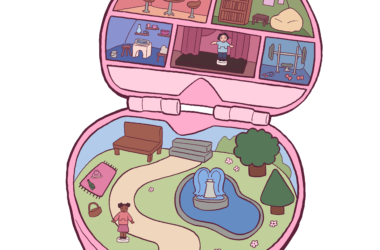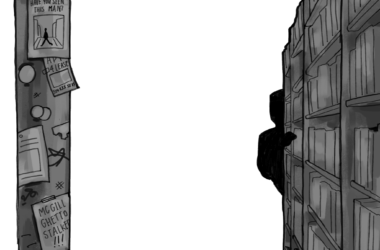As I sat down to write this article, I was feeling less than inspired. Plagiarism is a topic that has been covered excessively, and it is also a rather boring one. I’ve read the same warning paragraph on each of my course outlines this semester, as has everyone else. Needing a fresh new angle, I did what any self-respecting university student would do: I googled “articles on plagiarism” – just for encouragement, of course. I came up with a bunch of ways to avoid plagiarizing, instances of cheating in the corporate world and some guidelines for teachers to combat plagiarism in their classrooms. Unfortunately nothing I could…use. Damn it, I’d have to write this article all by myself.
Everyone plagiarizes, steals, and cheats just a little bit. People tell tiny white lies, recycle gossip from one friend to the next and repeat jokes from last night’s Family Guy in everyday conversation. When students are taught to write essays, they learn to emulate these habits: go to the library, take out five books on your topic, see what the experts have to say. Later, blend them into one long paper, putting everything in your “own” words. No original ideas required, just remember to cite whenever necessary. Every essay becomes reverent flattery of what all the “esteemed” writers have to say on the subject. It’s a flaw in our educational system, which values “academic integrity” without requiring genuine originality.
Academic integrity. It’s the part everyone skips on the syllabus in favour of checking how much participation counts for and whether the class includes a final exam. As soon as the professor begins the extremely vague but compulsory speech about the consequences of cheating in the university, our eyes glaze over. Thankfully, most professors finish discussing the subject within seconds, ending with the oft-heard “for further information, check the code of student conduct online.” Great. Except that no one ever does (except me of course, but that was only yesterday in the context of this article). The problem with plagiarism is not so much the deliberate offender, who lifts entire paragraphs out of textbooks or off the Internet and deserves their meetings with the Dean of Students. It’s the unintentional plagiarizers who need help discerning what is cheating and what’s legal, which is made more confusing by the copy-and-paste manner in which we are all taught to write.
Article 15(a) of McGill’s Code of Student Conduct and Disciplinary Procedures “No student shall, with intent to deceive, represent the work of another person as his or her own in any academic writing…” It is that intention that makes it such a prevalent issue, because most of the time, students get caught plagiarizing without even knowing they had committed the crime. Professor Monique Morgan of the English Department explains that plagiarism is a multi-faceted issue. When reading her students’ work, she is now forced to be more suspicious, which she would of course prefer not to have to be. More than that though, students are getting cheated out of the learning experience they deserve. In discussing McGill’s method for dealing with plagiarizing students, Morgan affirms that the crime is, “taken very seriously in the cases where it should be taken seriously.” She goes on to state though that more could be done to educate students early on about what the parameters are.
Students are not getting enough information about how to stay out of trouble with plagiarism and are receiving mixed messages about what formal essays should encompass. The disclaimer repeated year to year makes the offence sound like the kind of thing “that could never happen to me,” meaning most students never imagine the real consequences of such a debilitating and ugly transgression. Most McGill students are straight out of high school, where the speech on plagiarism runs along the lines of not copying off your neighbour during a test. The university needs to emphasize that the word plagiarism signifies more than wandering eyes and students need to educate themselves on what academic integrity really means.







